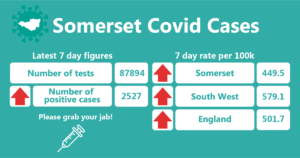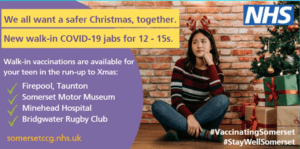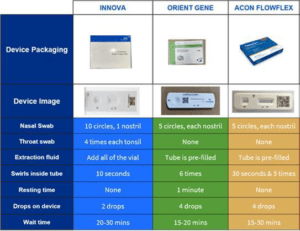Welcome to the latest edition of the weekly Somerset Covid-19 update for key stakeholders. This update is produced on behalf of the Somerset Covid-19 Engagement Board and is designed to provide a weekly update on the current Covid-19 situation in Somerset.
Covid-19 case numbers in Somerset have slightly increased this week and remain high. As Omicron begins to spread through regions of the UK, early concerns about the pressure on the NHS, which may arise as a result of this new variant, have prompted the Government to announce a move to ‘Plan B’ of the Covid-19 response. Full details can be found on the GOV.uk website, and the main changes are as follows:
- From 10 December, face coverings will be required by law in most indoor settings
(including theatres and cinemas but NOT hospitality settings). - From 13 December office workers who can work from home should do so.
- From 15 December, certain venues and events will be required by law to check all visitors aged 18 years or over are fully vaccinated, have proof of a negative test in the last 48 hours, or have an exemption.
- Daily tests for contacts of people suspected of having the Omicron variant will be introduced to replace the current isolation rules. Until the new tests are available contacts of suspected Omicron cases will be required to self-isolate for 10 days, regardless of their age or vaccination status. Anyone who tests positive for Covid-19 is still required to self-isolate.
These new regulations will be reviewed on 5 January 2022.
Omicron is a variant of Covid-19 so the same basic protective measures we can all adopt will still help stop the spread of the virus. This means washing hands regularly, wearing face coverings when required, taking lateral flow tests before a period of high risk such as visiting a family member or attending an event, getting both doses of the vaccine, and booking a booster when you are able and meeting up in well-ventilated spaces, or outdoors if possible. If you have any symptoms of Covid-19, you should self-isolate immediately and get a PCR test via the GOV.uk website.
In the lead up to Christmas we tend to socialise more, especially with people we may not have seen for a while. This gives the virus a chance to spread more and makes it particularly important to protect ourselves and others.
The vaccine remains our best line of defence, so please step forward whether it’s for your first, second or booster jab. Check eligibility for the booster here. Our vaccination rate in Somerset is very high so thank you to everyone who has taken up the offer so far.
Latest Covid Dashboard: The following link below will take you to our website: Coronavirus (COVID-19) (somerset.gov.uk) Then scroll down the page until you get to ‘COVID-19 Dashboard’ in the list. Click on this and the dashboard will open.
‘Remember, everyone can catch it, anyone can spread it’.



| David Fothergill, Leader of Somerset County Council Twitter: @DJAFothergill | Trudi Grant, Director of Public Health Twitter: @SomersetDPH | Clare Paul, Cabinet Member for Public Health and Wellbeing Twitter: @Clarepaul_ |

In the week up to 5 December, approximately 87,894 tests were carried out across the county with 2,527 new confirmed cases. The rates have increased slightly in the last reporting week to 449.5 per 100.000. This is below both the South-West average and the national average.
Hospitalisation data for Somerset remains at just above 40 Covid-19 in-patients in Somerset hospitals.
This Week’s Headlines:
The main items featured in this week’s update are:
- Workplace, Care and School settings
- Vaccinations Update
- Testing Update
- Omicron Variant
- Resources and further information
Workplaces: New measures have been put in place as a precaution because cases of Omicron (variant of concern) have been found across the UK. There are changes to the rules in England on self-isolation, testing after international travel, and face coverings.
The Working Safely guidance has been updated to reflect these changes:
Working safely during coronavirus (Covid-19) – Guidance, visit the GOV.uk website for more information.
Visit the GOV.uk website for guidance for those working in, or running businesses in the following sectors:
- Construction and other outdoor work
- GOV.uk website – events and attractions
- Hotel and guest accommodation
- Offices, factories and labs: (includes plants, warehouses, labs, research facilities and similar indoor environments).
- Restaurants, pubs, bars, nightclubs and takeaway services
- Shops, branches, and close contact services: (including people providing close contact services, including hairdressers and beauticians).
Care Sector: We continue to see cases of Covid-19 in our care settings and have recently seen outbreaks of not only Covid-19 but other respiratory infections like Flu. We are all working together to manage the situation and the key principles of prevention, vaccination and control continue to apply.
Ventilation – invitation for care homes to participate in air filter study:
- Good ventilation can stop us encountering Sars-CoV-2 and other airborne viruses, although it can be difficult in the winter months to adequately ventilate some care settings.
- The NIHR would like to invite care homes to take part in a study which aims to find out whether HEPA air filters prevent respiratory infections including Covid-19.
- The research information sheet, has a details including the study background, aims, care home eligibility and what would be involved if your care home were to take part.
- If after considering the information you would like to express an interest in taking part in the pilot phase (this winter) or in the future, please complete the expression of interest form
- If you have any questions, please feel free to email the study team at [email protected]
Vaccination
- We all know vaccinations are an important tool to protect both our vulnerable population and care staff from severe disease if infected with Covid-19.
- Booster vaccinations are available for all residents and care staff – if any care providers are having difficulty in accessing booster vaccinations, please contact Adult Social Care on [email protected]
- A gentle reminder also to please update the Capacity Tracker with vaccination figures – this has now become an urgent request so the data reported truly reflects the actual number of individuals who have received their boosters.
Identification and reporting of respiratory infections
Prompt identification of changes in the condition of the residents and vulnerable people we care for and steps to ensure we identify respiratory infections by testing are key to stopping the spread of Covid-19 and other respiratory infections.
Testing: Please follow the latest testing guidelines, they can be found on the GOV.uk website.
Reporting of all Covid-19 cases and other suspected respiratory outbreaks: please report all cases of Covid-19 to the Health Protection Team at UK Health Security Agency (UKHSA, formerly Public Health England PHE) who can be contacted on 0300 303 8162, option 9 for a Covid-19 call or email them on [email protected]
12 days of caring at Christmas: In the public health team, we love this video made by our wonderful care sector – thank you to those who put
together this celebration of social care and the fantastic work you all do for us all to enjoy. Please share widely. Watch the 12 days of caring at Christmas video on YouTube.
Schools and Early Years settings: Directors of Public Health (DsPH) across the South West reached consensus on the 25 November to continue with current Covid-19 response measures in place in educational settings, until the end of the Autumn term. This advice still stands, any further national guidance will be communicated when it is received. Find out more on the Support Services for Education (SSE) website.
Covid-19 Testing on Return in January for all Educational and Childcare Settings in England: The DfE have requested all secondary schools must prepare to test their pupils once on-site, when they return in January.
Secondary schools will have the option to stagger the return to school for the
first week to accommodate on-site testing. Schools have the flexibility to consider how best to deliver the one test on return according to their circumstances. For settings remaining open over the Christmas period (such as private nurseries or adult education providers), staff and students should continue to test at home twice per week over the holiday period.
FE and HE students, and staff in all educational and childcare settings, should take one self-test at home either the evening or morning before they return in January. Then they should continue to test in line with government guidelines.
Staff, pupils and students should continue to test when at risk i.e. in situations when they are more likely to catch or spread Covid-19 and before visiting people who are at higher risk of severe illness if they get Covid-19.
Covid-19 Educational Webinar Every Thursday: The South-West Health Protection Team run free weekly Covid-19 educational setting webinars, which all educational settings are welcome to attend. The sessions cover infection prevention principles and then discuss scenarios to illustrate this.
Primary school testing: We continue to see many cases in primary schools in Somerset, therefore it’s important to encourage, household, parent and staff LFD testing. Please also be aware the Public Health team could advise daily LFD testing for certain groups during an outbreak.
Any close or household contacts of confirmed cases of Covid-19 to book a PCR test and whilst awaiting test results, undertake a daily LFD test and only attend school if this is negative – this includes students of primary age under parental discretion. The new LFD tests are nasal swabs only and much easier to use than previous stocks.
Symptomatic and Asymptomatic Testing: For those settings closing over Christmas, all staff and students should test over the holidays in line with national guidance.
As a reminder, staff, students and parents should not retest with LFD or PCR within 90 days of a positive PCR test, unless they develop new symptoms. This could report a positive due to residual virus from that infection rather than a new infection. This is particularly important as we understand some schools are asking for a negative result to come into school after a period of self-isolation – this is not public health advice.
SCC PH advice remains consistent with national guidance:
- Only use twice weekly LFD testing for asymptomatic cases
- Make sure you do an LFD according to the instructions and at least 30
minutes after eating or drinking or vaping - If you get a positive LFD or have symptoms get a PCR and use the
supervised PCR testing route at test centre to get the best quality test - Encourage secondary school age children to wear face coverings
in crowded or enclosed places, for example on school transport. You can download posters to help encourage uptake via the SSE website. - Take up the offer of vaccination
- All contacts of suspected Omicron cases must self-isolate, regardless of
their age or vaccination status. They will be contacted by NHS Test and Trace.
If you think your child is a close contact but has not been contacted directly by NHS Test and Trace then they should take a PCR test via the GOV.uk website or by calling 119.
When ordering a PCR test it is important to check the box (online) or tell 119 ‘I’ve been told to get a test by my health protection team’ and not ‘I’ve been told to get a test by my school or nursery’
Childhood Immunisation Programme: The Somerset Foundation Trust manage the childhood immunisation programme with SAINT (School Age Immunisation Nursing Team, part of the NHS). SAINT deliver the nasal flu vaccination to all schools in Somerset between October and December every year.
Immunisation sessions should still go ahead as planned when a school has a Covid-19 outbreak, unless specifically advised not to by a health protection team (HPT) or Director of Public Health (DPH). Other factors which may impact on the ability to offer immunisation sessions include the number of children still in school and whether the school has had to send some year groups home or close due to lack of staff.
SAINT will work with the school to ensure children who missed vaccinations because they were self-isolating at home or for other reasons, including exclusion, or missed consent deadline are re-offered immunisation at an appropriate time in the future. For more information visit the NHS website.
A full range of resources and information can be found on the SSE website.
Covid-19 Vaccine Programme: The government have announced second doses for secondary aged children 12 weeks after their first dose. The School Aged Immunisation Nursing Team (SAINT) await guidance on how this will be delivered, whether this will be an in-school offer or through community sites. As soon as we have further information, we will let you know.
Special school staff are eligible for Covid-19 boosters. Staff should be able to
book on the National Booking System.
There is a continued offer for all eligible young people to access their first dose via vaccination sites in Somerset for those who may have missed their school session.
Please could we ask that the following information is shared with all families via email, newsletter and school websites to ensure parents know how to access the vaccine for their children.
Bookable slots for 12-15-year-olds

There are bookable slots for 12 -15-year-olds (who have missed their school vaccination date) at vaccination centres; Somerset Motor Museum in Sparkford and Firepool in Taunton.
You can book through the National Booking Service online or by calling 119.
There are likely to be other clinics starting regularly in other areas in the coming weeks, we will endeavour to circulate this information as soon as it is available. Please encourage parents/guardians to check the NHS walk in site for up to date information.
Please note: If a child has tested positive for Covid-19 and is not at high risk from Covid-19, they need to wait 12 weeks before they can have a Covid-19 vaccine. This starts from the date they had symptoms, or the date of the positive test if they did not have symptoms.
Vaccination Update: All eligible adults in England aged 18 and over will be offered a Covid-19 booster vaccine by the end of January.
Following advice from the Joint Committee for Vaccination and Immunisation (JCVI), everyone who is currently eligible – including those aged 40 and over, health and social care workers and those at increased risk from the virus due to health conditions – will be able to book their Covid-19 booster vaccine from three months after their second dose.
The government and the NHS are urging younger people to wait until they are called forward by the NHS – with the more vulnerable continuing to be prioritised for their booster.
Younger age groups will be invited by the NHS in due course in order of age. It was also announced that, to speed up the vaccination programme, around 400 military personnel will be drafted in to support deployment, with 1,500 community pharmacy sites, additional hospital hubs, and pop-up sites opening in convenient locations across the country.
Evergreen offer: The Covid-19 vaccines are safe and effective. They give you the best protection against Covid-19.
If you haven’t had your first or second dose yet, you can still get it by booking through the NHS national booking service or by attending a walk-in clinic.
If you are eligible, you can get your vaccine at any time, even if you have been offered before but haven’t yet had it. Like any medicine, although the vaccine can cause some side effects, not everyone gets them. If you do, they are usually mild and do not last for very long. Getting the vaccine is the best protection for you and your loved ones.
To get your vaccine visit the NHS website or call 119 for an appointment. There are also convenient walk-in options across the country, which you can find on the NHS website.
Testing Update: In light of emerging evidence on the Omicron variant, from 7 December anyone aged 12 and above wishing to travel to the UK will need to show a negative pre-departure test (LFD or PCR) as close as possible to departure and not more than 48 hours before, to slow the importation of the new variant
From the 6 December, individuals will now receive the orient gene lateral flow test kits, if they order kits to be sent to their homes. Previously, the Acon Flowflex kits were being distributed for home testing.

Updated testing information following the Plan B announcement: Everyone should test using a lateral flow device, particularly before entering a high-risk setting involving people you wouldn’t normally come into contact with, or when visiting a vulnerable person. Lateral flow devices remain free of charge and can be collected from local pharmacies, visit the GOV.uk website for more information.
Testing will be a vital tool in controlling the spread given the likely increased transmissibility of Omicron. As there is now demonstrated community transmission of Omicron, we intend to introduce daily LFD tests for contacts of confirmed positive cases instead of the ten-day self-isolation period.
From Wednesday 15 December, and subject to parliamentary approval, the NHS Covid Pass on the NHS App will become mandatory for entry into nightclubs and settings where large crowds gather – including unseated indoor events with 500 or more attendees, unseated outdoor events with 4,000 or more attendees and any event with 10,000 or more attendees. People will be able to demonstrate proof of two vaccine doses via the app. Having considered the evidence since the emergence of Omicron, proof of a negative lateral flow test will also be accepted.
Omicron Variant: It has been confirmed there is now community transmission of the Omicron variant nationwide, and it is now present in Somerset. Professor Trudi Grant, Director of Public Health for Somerset County Council, said: “Please be assured that, just as we have done throughout the pandemic, all local health professionals are working hard to keep our county safe. We continue to work closely with the UK Health Security Agency (UKHSA) and regional partners. PCR testing is being carried out for identified individuals only, and we have no need for the general public to be tested as part of this work.
The scientific community is working urgently to understand the impact of Omicron with regards to vaccines, treatments and transmissibility and we will communicate all updates as soon as we receive them.
Resources and further information: Please do keep an eye our Healthy Somerset website, which has a huge amount of information and resources to help keep everyone healthy happy and safe at this time.
For the latest local information as well as digital resources, posters and flyers please visit the Somerset County Council website.
The Somerset Local Outbreak Management Plan outlines how we, the council, will work with the NHS Test and Trace Service, PHE, the NHS and other partners to ensure a whole system approach to preventing and managing local outbreaks. This can be found here.
Finally, please like them on Facebook, follow them on Twitter and share their posts with your networks to help them in communicating these important messages. Follow their Director of Public Health Twitter account too.

